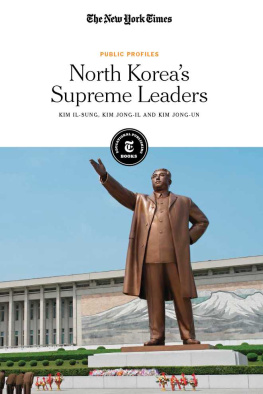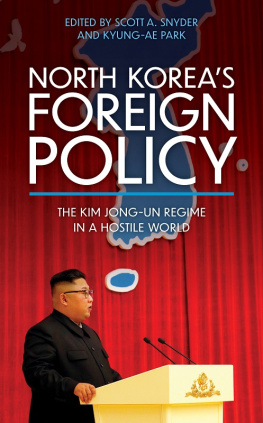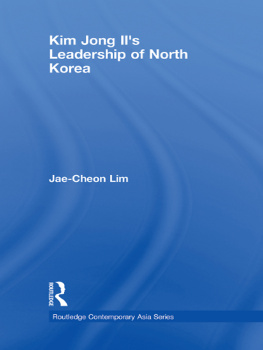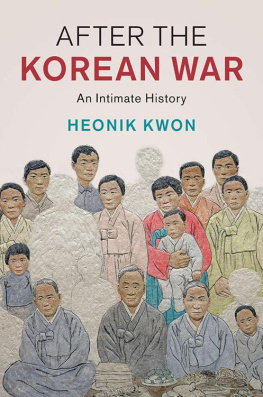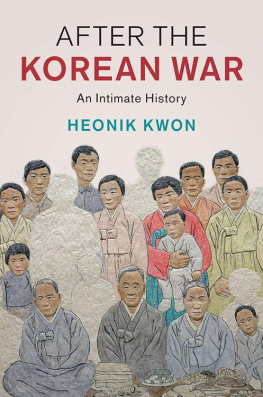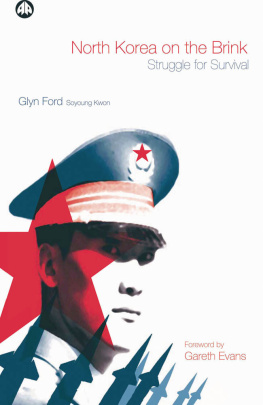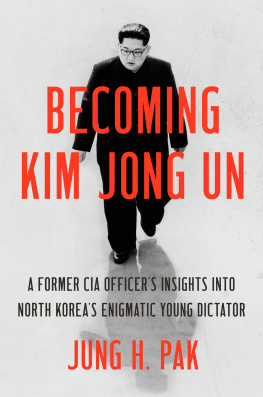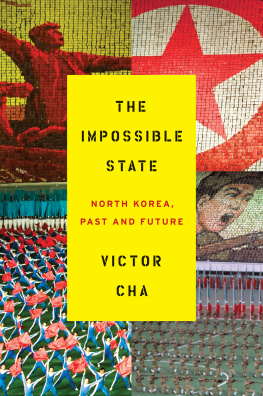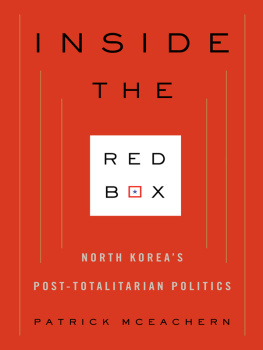About the Authors
Heonik Kwon is professorial senior research fellow at Trinity College, University of Cambridge, and previously taught anthropology at the London School of Eco nomics. He has conducted fieldwork in the former Soviet Union, Vietnam, and, more recently, Korea. Author of several prize-winning books, including Ghosts of War in Vietnam and The Other Cold War , he is currently directing the international Beyond the Korean War project, which explores the history and memory of the Korean War in local and global contexts.
Byung-Ho Chung is professor of cultural anthropology and director of the Institute of Globalization and Multicultural Studies at Hanyang University, South Korea. He is author of a number of works on North Korean and inter-Korean affairs, including the coedited Welcome to Korea: North Koreans in South Korea , and has visited North Korea and Chinas borders with North Korea on numerous occasions since the mid-1990s. He also has extensive humanitarian and research experience with North Korean youth migrants now settled in China and South Korea.
Acknowledgments
S everal institutions and many friends and colleagues have helped us to see this project through. We thank the Korea Research Foundation and the British Academy for supporting our work in the early stage. The completion of this work was supported by an Academy of Korean Studies grant funded by the Korean government (MEST) (AKS-2010-DZZ-3104). The Information Center on North Korea at South Koreas Ministry of Unification has provided most generous assistance in searching for and locating primary sources. Good Friends, Yonhap News, and Liu Jae Soo provided material for illustrations. Three postgraduate students at Hanyang University helped with compiling the illustrations and bibliography. We thank Jung Woo-Chang, Christina Hyunim Kim, and An Jong-Soo. Many ideas presented in this book grew out of a postgraduate seminar on North Korean culture at Hanyang University that we taught jointly in the autumn of 2008. We are grateful to Cho Hung-Youn, Bae Kidong, Lee Hee-Soo, Ahn Shin-Won, and Song Do-Young for the invitation.
Parts of this book were presented in lectures and seminars held at the University of North Korean Studies in Seoul, the School of Oriental and African Studies of the University of London, the London School of Economics and Political Science, the University of Cambridge, and the Max Planck Institute in Gttingen, as well as in Ann Arbor, Toronto, Hong Kong, Copenhagen, and Washington, DC. The meetings in Hong Kong and Toronto, in particular, provided important momentum in our consideration of North Koreas recent history through Max Webers insights into the historical life of revolutionary charismatic authority. We are grateful to Andre Schmid, Michael Shin, Youngju Ryu, Charles Armstrong, Chun Kyung-Soo, Hamm Taik-Young, Tam Ngo, Peter van der Veer, Camilla Srensen, Ed Simpson, Mark Morris, and Barak Kushner. Heonik Kwon extends special thanks to his colleagues at the London School of Economics, Deborah James and Charles Stafford, and to Lee Moon-Woong, emeritus professor of anthropology at Seoul National University, whose pioneering article published in 1976 has been an inspiring guide throughout the long preparation for this volume.
Byung-Ho Chung delivered presentations at the University of Illinois, Urbana-Champaign, the University of Hawaii, Waseda University, and the City University of Hong Kong. We thank David W. Plath, Nancy Abelmann, Geoffrey White, Ito Abito, and Jonathan London for their kind invitations. His ten visits to North Korea were made possible by kind assistance from several nongovernmental organizations as well as from the North Korean and South Korean administrations. Many other friends also provided support. Among them are Han S. Park, Hagen Koo, Hyong Kyu Rhew, John Feffer, Courtland W. Robinson, Suh Sung, Takizawa Hideki, Yoshida Yasuhiko, Cho Hyung, Cho-Han Hejoang, Kwon Hyuk-Beom, Jun Woo-Taek, Kim Young-Soo, Lee Gi-Beom, Lee Woo-Young, Lee Tae-Joo, Lee Soo-Jung, Lee Hyang-Kyu, Whang Sang-Ik, Jang Soo-Hyun, Pak Sun-Young, Chung Gene-Woong, and Chung Jean-Kyung. Byung-Ho Chung extends special thanks to the late South Korean journalist and eminent public intellectual Lee Young-Hee, who showed keen interest in and supported the project despite his failing health during his last years.
Susan McEachern and Mark Selden have provided an abiding support throughout, and we are grateful for their enthusiasm and critical intervention. The comments from the anonymous reviewer were immensely helpful not only in tightening the argument but also in clarifying the broad conceptual framework within which we discuss the evolution of North Koreas stateliness. The editors of three journals kindly allowed us to reuse materials first published with them: North Koreas Politics of Longing, Critical Asian Studies 42 (2010): 324; North Koreas Theatre State, Korean Studies Forum 4 (2010): 2754; and Kkchangkukka bukhani sangjingkwa irye [Symbol and ritual in the theater state of North Korea], Tongilmunjaeyngu [Korean journal of unification affairs] 22 (2010): 142.
Finally, we are deeply obliged to our friends and interlocutors of North Korean origin. They taught us how to read and think through North Korean literature and art; the analysis put forward in this book stems, to a great extent, from their knowledge and wisdom. Kim Suk Jong has been particularly forthcoming, at times even going against her need to protect herself from recalling some of her past experiences in North Korea. This book is dedicated to the children in North Korea who, like Suk Jongs children, have been struggling through the Arduous March so courageously.
Bibliography
An, Tai Sung. North Korea in Transition: From Dictatorship to Dynasty . Westport, CT: Greenwood Press, 1983.
Anderson, Benedict. Imagined Communities: Reflections on the Origin and Spread of Nationalism. New York: Verso, 1991.
Apter, David E. Yanan and the Narrative Reconstruction of Reality. In China in Transformation , edited by Tu Wei-Ming, 20732. Cambridge, MA: Harvard University Press, 1994.
Arendt, Hannah. On Violence. New York: Harcourt Brace, 1969.
. The Human Condition . Chicago: University of Chicago Press, 1958.
Armstrong, Charles K. A Socialism of Our Style: North Korean Ideology in a Post-Communist Era. In North Korean Foreign Relations in the PostCold War Era , edited by Samuel S. Kim, 3438. New York: Oxford University Press, 1998.
. Centering the Periphery: Manchurian Exile(s) and the North Korean State. Korean Studies 19 (1995): 116.
. Juche and North Koreas Global Aspirations. Woodrow Wilson Center North Korea International Documentation Project. Working Paper 1. 2009. http://www.wilsoncenter.org/topics/pubs/NKIDP_WP_1.pdf (accessed April 2009).
. Socialism, Sovereignty, and the North Korean Exception. In North Korea: Toward a Better Understanding , edited by Sonia Ryang, 4156. Plymouth, MA: Lexington Books, 2009.
. The Koreas. New York: Routledge, 2007.
. The North Korean Revolution, 19451950 . Ithaca, NY: Cornell University Press, 2004.
Arrighi, Giovanni. The Long Twentieth Century: Money, Power, and the Origins of Our Times. London: Verso, 2010.
Arrighi, Giovanni, Takeshi Hamashita, and Mark Selden, eds. The Resurgency of East Asia: 500, 150 and 50 Year Perspectives. London: Routledge, 2003.
Bauman, Zygmunt. After the Patronage State: A Model in Search of Class Interests. In The New Great Transformation?: Change and Continuity in East-Central Europe , edited by Christopher G. A. Bryant and Edmund Mokrzycki, 1435. New York: Routledge, 1993.
Behrend, Heike. Power to Heal, Power to Kill. In Spirit Possession: Modernity and Power in Africa , edited by Heike Behrend and Ute Luig, 2033. Oxford: James Currey, 1999.


